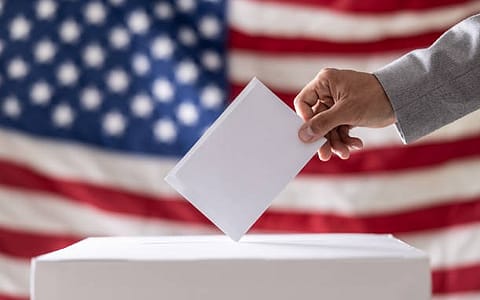U.S. Elections: Trump's policies likely to boost IT growth, Harris may keep status quo
Over FY15-24, H-1B approvals for major players like Infosys, TCS, and Wipro have declined by 50-80%.

As the U.S. approaches a crucial presidential election on Tuesday, voters will decide between two prominent candidates, Kamala Harris and Donald Trump, marking a critical showdown that will shape the nation's direction for the next four years. The election results are expected to impact both domestic policies and the global economy, especially the IT services sector. While Trump's fiscal policies could drive IT demand, a Harris presidency may restore the status quo.
A recent JM Financial report highlights the significant impact Trump's first term had on employment-based immigration, particularly concerning the H-1B visa program, which is vital for many IT companies. Trump's executive order E.O.13788, titled ‘Buy American and Hire American,’ tightened restrictions, which resulted in a dramatic rise in visa denial rates for H-1B and L-1 visas.
In FY17, two-thirds of IT services workers in the U.S. relied on H-1B or L-1 visas, but this has shifted as companies adapt to new policies. Over FY15-24, H-1B approvals for major players like Infosys, TCS, and Wipro have declined by 50-80%. The report estimates that by FY20, less than 50% of Infosys's U.S. employees held H-1B/L-1 visas, and Wipro noted a localisation rate of 69% for its global workforce.
Additionally, Trump's policies might have led to increased wage obligations for H-1B visa holders. The Trump administration sought to implement this via the Department of Labor’s (DOL) Interim Final Rule (IFR) in October 2020 and January 2021, but the rule was later overturned by the courts. Currently, H-1B wages are reported to be 0-35% higher than prevailing local wages, indicating that impact when reintroducing such policies would be limited for IT service players.
Moreover, Trump's fiscal policies, such as reducing the corporate tax rate from 21% to 15%, could enhance demand for IT services by alleviating budget constraints. While Trump's policies may result in higher interest rates and slower global growth in the long run, the immediate reduction in the corporate tax rate could bolster demand for IT services.
Recommended Stories
During Trump’s first term from January 20, 2017, to January 20, 2021, IT stocks experienced considerable gains, with TCS up 189%, Infosys by 182%, Wipro by 148%, HCL Tech by 138%, and Tech Mahindra by 117%, according to data from AceEquity.
Currently, three bills related to employment-based immigration are under consideration in Congress, aiming to protect the U.S. workforce while prioritising high-skilled workers and streamlining the immigration process. These bills could lead to stricter compliance requirements for IT services.
(INR CR)
Towards the end of Trump's first term, his administration introduced two Interim Final Rules targeting the H-1B program, arguing that it was being exploited by companies to displace U.S. workers. They noted that from FY 2003 to 2019, the proportion of IT workers in the H-1B population rose by 75%, while IT jobs in the broader U.S. economy increased only by 16%. Many H-1B visa holders were reportedly paid below the local median wage for their positions, prompting the administration to seek higher wage requirements.
Key proposed changes in the immigration related bills in the US Congress:
- H-1B visas may prioritise workers with advanced degrees and higher salaries, moving away from the lottery system. This change favours highly skilled professionals.
- The bill introduces provisions to ensure that H-1B and L-1 visa holders are paid competitive wages, aiming to protect American workers from potential wage suppression due to visa-driven employment.
- Employers with a high percentage of H-1B and L-1 workers (often outsourcing firms) may face more restrictions, including limits on visa allocation and strict documentation requirements to demonstrate the necessity of each visa.
The report indicated that the provisions in this bill were not viewed as harmful to Indian IT services, as these companies generally met most of the requirements. However, it noted that the bill could increase compliance obligations related to maintaining and providing adequate evidence of H-1B/L-1 visa placements at client sites and the associated wages.
High-skilled Immigration Reform for Employment Act: This bill seeks to enhance the employment-based immigration system for highly skilled workers in the United States.
Key provisions of this bill:
- The bill proposes removing per-country caps for employment-based green cards, which would benefit applicants from countries with high demand, such as India and China.
- To manage the influx from countries like India and China, the bill suggests a transition period, initially setting aside a certain percentage of green cards for other countries to maintain diversity in immigration.
- Indian nationals, who constitute a large proportion of H-1B visa holders, could see significant benefits, as this change would reduce their green card wait times.